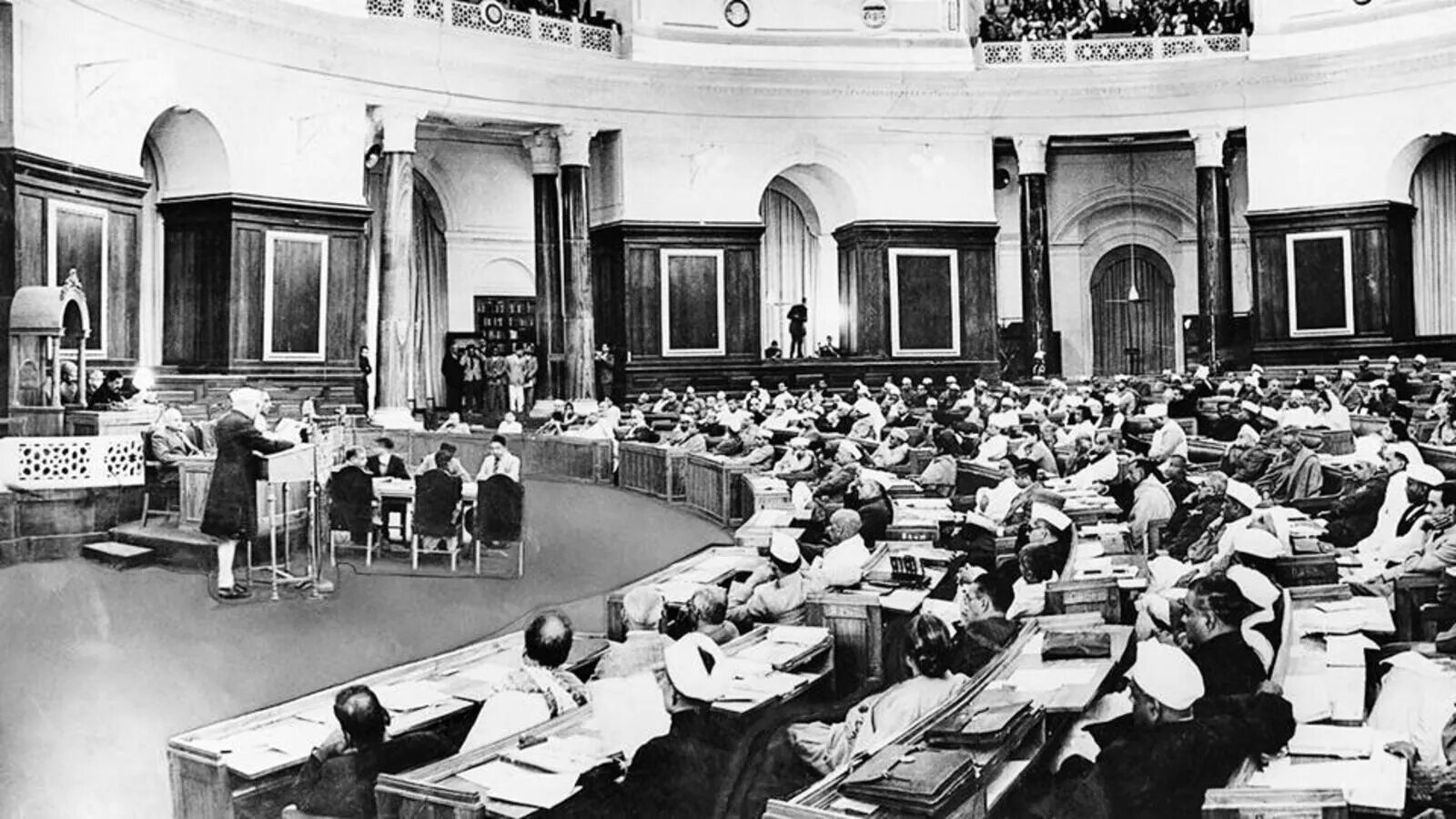This article will delve into the contributions made by members of the Constituent Assembly hailing from what is now known as Karnataka.
1. K.C. Reddy – Kyasamballi Chengalaraya Reddy served as the first Chief Minister of Mysore from 1947 to 1952. Reddy was an active participant in the freedom movement, establishing the “Praja Paksha” in 1930 to advocate for stable governance in the Princely State of Mysore. In 1934, it merged with Praja Mitra Mandali to form the Mysore People’s Federation, which later aided the Indian National Congress in the freedom struggle. Reddy, a member of the Constituent Assembly of India, played a crucial role in negotiating the integration of Mysore State into Independent India.
2. Kengal Hanumanthaiah – During his tenure, he strongly advocated for decentralisation, emphasising the need to empower provincial legislatures and the people in the provinces. In a debate on Emergency powers outlined in the Constitution, he expressed dismay at the tendency to overlook provincial governments and to attribute excessive power to the Central Government in Delhi. Furthermore, he voiced concerns regarding the complexity and numerous provisions within the chapter on fundamental rights. Notably, it was under his leadership as Chief Minister that the Vidhana Soudha, now home to the Karnataka Legislature, was constructed.
3. T. Siddalingaya – A politician from Mysore (now Karnataka), served as a member of the Mysore Legislative Council from 1947 to 1950. He was a member of the Constituent Assembly of India. Lastly, he represented the state of Mysore in the Rajya Sabha from 1967 to 1970.
4. T. Channiah – was one of the members who took part in the debate by addressing the Assembly in Kannada, despite Hindi and English being the official languages.
5. S. Nijalingappa – A lawyer and politician, Nijalingappa possessed an extensive political career despite his relatively limited participation in the Assembly debates. His political journey began with his election as the President of the Chitradurga District Congress Committee in 1936, where he played a pivotal role in strengthening the Congress movement in Mysore. Subsequently, he represented Chitradurga in the Mysore Representative Assembly in 1937 and served as the President of the Mysore Congress Working Committee from 1938 to 1950. Nijalingappa’s leadership skills were further recognised when he was appointed as the President of the Karnataka Pradesh Congress Committee, tasked with resolving factional disputes within the state. Transitioning to national politics, he ascended to the role of President of the All-India Congress Committee in 1968, marking a significant milestone in his illustrious political career.
6. B.N. Rau – serving as the Constitutional Advisor to the Constituent Assembly, embarked on a global journey to consult with constitutional experts, gathering insights to aid in the drafting process. He meticulously crafted a preliminary draft, which was presented to both the Drafting Committee and the Constituent Assembly for review and consideration. His significant contributions extended to the incorporation of Directive Principles of State Policy into the constitution, along with facilitating thorough discussions on the concept of ‘due process’ within its framework.
7. Ramaswamy Mudaliar – Having served as a member of the Madras Legislative Council, Mudaliar displayed a profound commitment to educational reform. Subsequently, in 1946, he assumed the role of Chief Minister of Mysore State. He was a staunch advocate for a robust federal structure, actively participating in debates concerning fiscal federalism. Additionally, Mudaliar enjoyed a distinguished career in international relations, leading multiple Indian delegations to the United Nations. Notably, in 1946, he was elected as the inaugural President of the United Nations’ Economic and Social Council.
8. C.M. Poonacha – the sole representative from Coorg in the Constituent Assembly, had limited involvement in its proceedings. However, he went on to become Coorg’s inaugural and the only Chief Minister. Prior to this role, Poonacha served as an elected member of the Coorg Legislative Council until 1951. His political career extended to the national level, where he held various positions including membership in the Rajya Sabha from 1964 onwards. Throughout his tenure, he held several ministerial portfolios, including Minister of State for Finance, Minister of State for Transport, Aviation, Shipping, and Tourism, Union Minister of Railways, and Union Minister for Steel and Heavy Engineering.
9. Krishnamoorthy Rao – Rao addressed issues regarding the fiscal ties between the Union and the States in the Constituent Assembly. Simultaneously engaged in political activities within the Congress Party, he also pursued a career as an advocate. Notably, he held the position of the first Deputy Chairman of the Rajya Sabha from May 31, 1952, to March 1, 1962, and later served as the Deputy Speaker in the Lok Sabha from 1962 onwards.
10. M.V. Rama Rao – He remained silent in the Constituent Assembly and had been a member of the Mysore Representative Assembly since 1945. Additionally, he served as a member of the Provisional Parliament in 1950 and was subsequently elected to the Mysore State Assembly in 1952. His political journey culminated in his appointment as the Home Minister of the Mysore state during 1956-57.
Note: There is no information accessible regarding H R Guruv Reddy and H Siddaveerappa, who served as members of the Constituent Assembly representing the state of Mysore.
A few quotable quotes:
- “The Indian Constitution is not just a legal document but a Magna Carta of socio-economic transformation of the country.” – Jawaharlal Nehru, First Prime Minister of India.
- “The Indian Constitution, when it was framed, was based on the presumption that those in power would adhere to the norms it laid This presumption has proven to be mistaken.” – Atal Bihari Vajpayee, Former Prime Minister of India.
- “Constitution is not a mere lawyer’s document, it is a vehicle of Life, and its spirit is always the spirit of ” – Dr. B.R. Ambedkar.
Sources:
- https://amritmahotsav.nic.in/district-reopsitory-detail.htm?9799
- https://constitutionofindia.net/members/kengal-hanumanthaiah/
- https://deccanherald.com/opinion/when-the-member-from-kolar- insisted-on-speaking-in-kannada-1001940.html
- https://dbpedia.org/page/T._Siddalingaya
- https://constitutionofindia.net/members/s-nijalingappa/
- https://constitutionofindia.net/members/a-ramaswamy-mudaliar/
- https://constitutionofindia.net/members/c-m-poonacha/
- https://eparlib.nic.in/bitstream/123456789/782490/1/publications_whosho_english_01_1952.pdf
- https://constitutionofindia.net/members/krishnamoorthy-rao/
- https://www.newindianexpress.com/cities/bengaluru/2020/Jan/26/karnataka-stalwarts-contribution-to-the-making-of-india-2094692.html
- https://www.constitutionofindia.net/members/m-v-rama-rao/
- https://www.constitutionofindia.net/members/kengal-hanumanthaiah/
- https://www.deccanherald.com/india/karnataka/the-man-who-laid-the-bedrock-for-the-indian-constitution-942520.html




